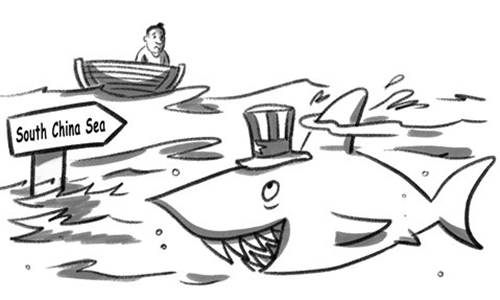Manila, Washington seize on S.China Sea ruling
By Yan Yan Source: Global Times Published: 2020/7/13 23:08:40

Illustration: Liu Rui/GT
Although the ruling by the Arbitral Tribunal regarding the South China Sea (SCS) on July 12, 2016 was put aside after Philippine President Rodrigo Duterte took office that same year, the country's claim and policy has never changed. It has become tougher instead. A statement made Sunday by Foreign Secretary of the Philippines Teodoro Locsin is latest reflection of this stiff resolve.
Duterte has refused to enforce the ruling while attaching more importance to cooperation with China. However, the country has actually acted in accordance with the Tribunal's opinion, which has received support across the country since July 12, 2016.
Some Filipinos, represented by former acting chief justice Antonio Carpio, have repeatedly called on their government to enforce the ruling and seize the fruits of their so-called victory over China. The Philippines has constructed a beaching ramp on Zhongye Island - which it unlawfully occupied - to allow movement of construction materials and heavy equipment for infrastructure.
The country's Consultative Committee implicitly included the award of the arbitration into its draft constitution in July 2018, claiming the country "has sovereignty over islands and features outside its archipelagic baselines pursuant to the laws of the Federal Republic, the law of nations, and the judgments of competent international courts or tribunals."
Nonetheless, in the past four years, with China's constant efforts to promote rules-based maritime orders in the SCS, the first reading of the Code of Conduct in the SCS was already finished in July 2019 ahead of schedule. The regional situation has been stable with maritime cooperation between China and regional countries being conducted in many fields.
But recently the US has made unnecessary waves. Washington has taken advantage of opposition within the Philippines to sow discord. It has instigated Manila to be tougher against Beijing in terms of the SCS issue.
Since the beginning of 2020, Manila has issued several statements against China, expressing concerns over a vessel collision in April in which a Vietnamese fishing vessel struck a China Coast Guard ship, over China's establishment of Nansha District whose local government is stationed on Yongshu Reef, and over China's maritime drills in the waters off the Xisha Islands.
The US has done a lot behind the closed doors to make close its relations with the Philippines, an important ally that the US won't give up easily. Washington will probably interfere more in the SCS issue by manipulating Manila and increasing its military presence in the region. This will likely involve deploying more troops and conducting joint drills with regional countries.
Despite being a non-claimant of the South China Sea, the US desires to stir up troubles. It takes advantage of regional countries' claims to sow discord between these countries and China. It portrays a bully image of China. Washington has launched such campaigns since the outbreak of the COVID-19 pandemic. It has smeared Beijing as a bully that uses the pandemic to gain profits from the SCS.
The US' slander is groundless. The US media, some officials, and even certain academic circles have formed relatively common views to demonize China. They would grasp every chance to exaggerate any happening in the SCS. Therefore, they certainly wouldn't miss something like the anniversary of 2016 arbitration.
The countries at the South China Sea need to clearly see the US' malicious intentions and adhere to the principle of settling disputes by peaceful means, and through effective bilateral negotiations.
Take China and the Philippines. The two countries established a bilateral consultation mechanism on the SCS in 2017 and carried out five meetings as of October 2019. These addressed differences and promoted their pragmatic cooperation. They also included collaboration relating to the coast guard and fisheries. Such mechanisms have effectively improved bilateral relations and crisis management talks.
In the future, under the premise of friendly consultation and peaceful settlement, all regional countries should consider setting up bilateral consultation mechanisms. These will advance maritime cooperation and enhance mutual trust so that all can work together for peace and stability in the area.
The author is director of the Research Center of Oceans Law and Policy in the National Institute for South China Sea Studies. opinion@globaltimes.com.cn
Posted in: VIEWPOINT